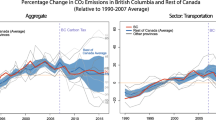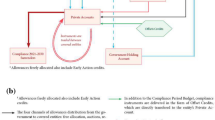Abstract
CO2 emission allowances help to internalise effects of fossil fuel consumption on global climate and sea levels. However, consumption, production and investment decisions do not reach the optimal allocation when the scheme is only implemented in some countries. Production with inefficient facilities in non-participating countries may even increase. Border tax adjustment (BTA) for costs incurred from procuring CO2 emission allowances reduces the leakage. We show that BTA can be both feasible and compatible with World Trade Organization (WTO) constraints. Practicable implementability requires a focus on CO2 emissions from certain processed materials and a separate treatment of electric energy input.
Similar content being viewed by others
References
Azar, C. (2005). Post-Kyoto Climate policy targets - Costs and competitiveness implications. Climate Policy, 5(3), 309–328.
Babiker, Mustafa H. (2005). Climate change policy, market structure, and carbon leakage. Journal of International Economics, 65, 412–445.
Biermann, Frank, & Brohm, Rainer (2003). Implementing the Kyoto Protocol without the United States: The strategic role of energy tax adjustments at the border, Working Paper of the Global Governance Project, no. 5, http://www.glogov.org/workingpapers/workingpaper5.html
Carnegie Mellon University Green Design Initiative. (2003). Economic Input–Output life Cycle Assessment (EIO-LCA) model, http://www.eiolca.net, Accessed September 2003.
Crals, Evy, & Vereeck, Lode (2005). Taxes, tradable rights and transaction costs. European Journal of Law and Economics, 20, 199–223.
Daniel, C. Esty (1994). Greening the GATT—Trade, environment and the future. Washington/D.C: Institute for International Economics.
De Cendra, Javier (2006). Can emissions trading schemes be coupled with border tax adjustments? An analysis vis-à-vis WTO law. Review of European Community and International Environmental Law, 15(2), 131–145.
Demailly, Damien, & Quirion, Philippe (2005). Leakage from climate policies and border tax adjustment: Lessons from a geographic model of the cement industry, http://www.centre-cired.fr/perso/ quirion/ demailly_quirion_venice_final.pdf
Demaret, Paul, & Stewardson, Raoul (1994). BTA under GATT and EC law and general implications for environmental taxes. Journal of World Trade, 28(4), 5–65.
Doelle, Meinhard (2004). Climate change and the WTO: Opportunities to motivate state acation on climate change through the World Trade Organization. Review of European Community and International Environmental Law 13(1): 85–103.
Fauchald, Ole Kristian (1998). Environmental taxes and trade discrimination. London: Kluwer Law International.
Goh, Gavin (2004). The World Trade Organization, Kyoto and energy tax adjustments at the border. Journal of World Trade, 38(3), 395–423.
Grosman, Gene M. (1980). BTA: Do they distort trade. Journal of international economics, 10, 117–128.
Grubb, M., & Neuhoff K. (2006). Allocation and competitiveness in the EU emissions trading scheme: Policy overview. Climate Policy, 6(1), 7–30.
G8 summary statement. (2007). Joint declaration by the G8-Presidency and Brazil, China, India, Mexico and South Africa, 2007.
Hekman, John S. (1978). An analysis of the changing location of iron and steel production in the twentieth century. The American Economic Review, 68(1), 123–133.
Hoel, Michael (2005). The triple inefficiency of uncoordinated environmental policies. Scandinavian Journal of Economics, 107(1), 157–173.
Howse, Roland, & Donald, Regan (2000). The product/process distinction—An illusory basis for disciplining “Unilateralism” in trade policy. European Journal of International Law, 11, 249–289.
Hufbauer, Gary C. (1996). Fundamental tax reform and border tax adjustments. Washington/D.C: Institute for International Economics.
Ismer, Roland, & Sailer, Norbert J. (2003). Der neue Artikel 27 OECD-MA: Amtshilfe bei der Beitreibung und Sicherung von Steueransprüchen, Internationales Steuerrecht 2003, pp. 622–632.
Johansson, Bengt (2006). Climate policy instruments and industry—Effects and potential responses in the Swedish context. Energy Economics, 43, 2344–2360.
Lang, Michael (2005). “Taxes Covered” —What is a “Tax” according to Art. 2 OECD model convention? Bulletin for International Fiscal Documentation 2005, 216–223.
Mæstad, Ottar (1998). On the efficiency of green trade policy. Environmental and Resource Economics, 11, 1–18.
Mathiesen, Lars, & Mæstad, Ottar (2004). Climate policy and the steel industry: Achieving global emission reductions by an incomplete climate agreement. Energy Journal, 25, 91–114.
Mattoo, Aadity, & Subramanian, Arvin (1998). Regulatory autonomy and multilateral disciplines: The dilemma and a possible solution. Journal of International Economic Law, 1, 303–322.
Petersmann, Ernst-Ulrich (2000). International trade law and international environmental law: Environmental taxes and BTA in WTO law and EU law. In R. L. Revesz, P. Sands, & R. B. Stewart (Eds.), Environmental law, the economy and sustainable development. Cambridge/UK.
Pitschas, Christian (1994). GATT/WTO rules for BTA and the proposed European directive introducing a tax on carbon dioxide emissions and energy. Georgia Journal of International and Comparative Law, 24, 479–500.
Quick, Reinhard, & Lau, Christian (2003). Environmentally motivated tax distinctions and WTO law—The European commission’s green paper on integrated product policy in light of ‹Like Product’ and ’PPM‹-debates. Journal of International Economic Law, 6(2), 419–458.
Roller, Lars-Hendrik, & Frode, Steen (2005). On the workings of a cartel: Evidence from the Norwegian cement industry. The American Economic Review, 96(1), 321–338.
van Calster, Geert (1999). The WTO appellate body in Shrimp/Turtle: picking up the pieces. European Environmental Law Review, 8(4), 111–119.
Weber, Frank-Andreas, Jenseits, Wolfgang, & Fritsche, Uwe R. (1999). Bestimmung des Kumulierten Energieaufwands (KEA) durch Input–Output- und Prozessketten-Analyse am Beispiel des Sektors NE-Metalle“, Working Paper, Oeko-Institut.
Zarrilli, Simonetta (2003). Domestic taxation of energy products and multilateral trade rules: Is this a case of unlawful discrimination?. Journal of World Trade, 37(2), 359–394.
Zhang, Zhong Xiang (1998). Greenhouse gas emissions trading and the world trading system. Journal of World Trade, 32(5), 219–239.
Zhang, Zhong Xiang, & Baranzini, Andrea (2003). What do we know about carbon taxes? An inquiry into their impacts on competitiveness and distribution of income. East-West Center Working Papers, No. 56.
WTO cases
Chile—Taxes on Alcoholic Beverages, Report of the Appellate Body, adopted 12 January 2000, WT/DS87/AB/R, WT/DS/110/AB/R, (cit.: Chile – Alcohol).
European Communities—Regime for the Importation, Sale and Distribution of Bananas, Report of the Appellate Body, WT/DS 27/AB/R (cit.: European Communities—Bananas).
European Community—Measures Affecting Asbestos and Asbestos-Containing Products, Report of the Appellate Body, adopted 5 April 2001, WT/DS135/AB/R (cit.: European Community—Asbestos).
Japan—Taxes on Alcoholic Beverages, Report of the Appelate Body, adopted on 1 November 1996, WT/DS8/AB/R, WT/DS10/AB/R, WT/DS11/AB/R (cit.: Japan—Alcohol).
Korea—Measures Affecting Imports of Fresh, Chilled and Frozen Beef, Report of the Appellate Body, WT/DS161/AB/R, 11 December 2000, (cit.: Korea—Beef).
Korea—Taxes on Alcoholic Beverages, Report of the Appellate Body, adopted 17 February 1999, WT/DS75/AB/R,WT/DS84/AB/R. (cit.: Korea – Alcohol).
United States—Import Prohibition of Certain Shrimp and Shrimp Products, Report of the Appelate Body, adopted on 6 November 1998, WT/DS58/AB/R, DSR 1998:VII, p. 2803 (cit.: US—Shrimp).
United States—Measures Affecting Alcoholic and Malt Beverages, Report of the Panel adopted on June 19, 1992, BISD DS23/R - 39S/206 (cit.: US—Malt Beverages);
United States—Standards for Reformulated and Conventional Gasoline, Report of the Panel, WT/DS2/R, from 29 January 1996, adopted with alterations concerning other points on 20 May 1996, pp. 37 f. at 6.14 (cit.: US—Reformulated Gasoline, Panel Report).
United States—Standards for Reformulated and Conventional Gasoline, Report of the Appellate Body, adopted on 20 May 1996, WT/DS2/AB/R, DSR 1996:I, p. 21 (cit.: US—Reformulated Gasoline, Appellate Body).
United States—Taxes on Petroleum and Certain Imported Substances (“Superfund”), Report of the Panel adopted on 17 June 1987, BISD 34S/136, (cit.: US—Superfund).
Acknowledgements
Authors like to thank Arina Nikandrova for research assistance and participants at a DIW seminar, as well as Gernot Doppelhofer, Denny Ellerman, Christoph Herrmann and Michael Pollitt for valuable comments. Financial support from UK research grants SUPERGEN and TSEC are gratefully acknowledged. The usual caveat applies.
Author information
Authors and Affiliations
Corresponding author
Rights and permissions
About this article
Cite this article
Ismer, R., Neuhoff, K. Border tax adjustment: a feasible way to support stringent emission trading. Eur J Law Econ 24, 137–164 (2007). https://doi.org/10.1007/s10657-007-9032-8
Received:
Accepted:
Published:
Issue Date:
DOI: https://doi.org/10.1007/s10657-007-9032-8




